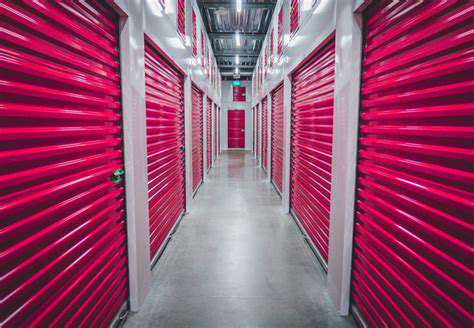How to Store Onions and Garlic: Proper Ventilation
Choosing the Right Storage Location

Factors to Consider When Selecting a Storage Location
Selecting an appropriate storage location is vital for safeguarding your data's integrity and ensuring easy access. Multiple aspects need evaluation, including security protocols, environmental controls, and logistical convenience. A strategically chosen storage space reduces risks and guarantees durable data protection. Tailor the storage environment to your specific needs, whether for confidential documents, precious artifacts, or critical digital files.
Ambient conditions like temperature swings and moisture levels can drastically affect stored materials. Excessive heat or cold may harm delicate items, while unstable humidity promotes mold formation. Addressing these variables is indispensable for maintaining stored goods in optimal condition.
Security Considerations for Storage Locations
Protecting stored assets demands rigorous security measures. Implementing comprehensive safeguards prevents unauthorized access and potential breaches. Options range from physical protections like surveillance systems to digital solutions such as advanced encryption. Proactive security planning substantially lowers the chances of data loss or theft.
Evaluate all possible threats including burglary, property damage, or natural calamities when assessing storage sites. An ideal location provides robust defenses against these hazards, ensuring your possessions remain secure under any circumstances.
Accessibility and Logistics of the Storage Location
Convenient access to stored items significantly impacts operational efficiency. Quick retrieval capabilities are fundamental for maintaining workflow continuity. Assess transportation routes, proximity to your operations, and any access restrictions. The facility should offer reliable entry during required hours or have secure remote access alternatives.
Thoughtful space organization enhances accessibility. A systematically arranged storage area enables faster item location, reducing time wasted searching and minimizing misplaced objects.
Climate Control and Environmental Factors
Sustaining proper environmental conditions is non-negotiable for prolonged storage. Precise temperature and humidity regulation preserves material quality over extended periods. This becomes particularly crucial for environmentally sensitive items. Invest in specialized climate control systems as part of your storage infrastructure.
Cost and Budget Considerations for Storage
Thoroughly analyze all storage-related expenses including rental fees, upkeep costs, and utility expenditures. Compare multiple alternatives while accounting for long-term financial commitments. Calculate the complete ownership costs to verify budget compatibility, including provisions for emergency repairs or system upgrades.
Regulations and Compliance Requirements
Various industries impose specific storage regulations that must be followed. Adherence to legal standards prevents costly violations and potential litigation. Research all applicable rules during the planning phase, including possible future regulatory changes that might affect your storage needs.
Storage Capacity and Scalability
Evaluate both immediate and projected storage demands. An adaptable storage solution that accommodates expansion ensures sustained operational effectiveness. Verify the facility can handle potential volume increases and offers flexible space configurations as your requirements evolve.

Protecting Against Moisture and Pests
Proper Storage Environments
Creating optimal conditions is fundamental for preserving onions and garlic. These bulbs thrive in cool, arid spaces with excellent airflow. Humidity variations and excessive moisture accelerate decay and attract pests. Ideal locations include ventilated pantries or temperature-regulated basements, avoiding damp areas.
Temperature regulation proves critical. Maintain storage between 50-60°F for best results. Temperature extremes compromise both shelf life and flavor profiles. Simple monitoring ensures your storage space remains within this ideal range.
Ventilation and Air Circulation
Effective airflow prevents dangerous moisture accumulation. Both onions and garlic rapidly deteriorate when exposed to dampness. Ensure your storage area has unobstructed air movement. Never store bulbs in sealed containers that trap humidity and promote rot.
Mesh storage bags or perforated containers enable proper ventilation around each bulb. This simple measure significantly reduces mold risks while preserving freshness.
Pest Prevention Strategies
Various pests threaten stored alliums, from rodents to fungi. Preventive actions are essential for long-term protection. Conduct thorough inspections of your storage space, sealing any potential pest entry points.
Maintaining cool, dry conditions naturally discourages most pests. Supplemental deterrents like cedar shavings or carefully placed repellents provide additional protection. Schedule regular inspections to promptly identify and address any infestations.
Choosing the Right Storage Containers
Container selection directly affects storage longevity. Avoid hermetic seals that promote moisture retention. Instead, choose breathable options like mesh sacks, paper bags, or ventilated crates. These promote essential air circulation while preventing condensation buildup.
Preparing Your Onions and Garlic for Storage
Proper preparation extends storage potential. Ensure complete post-harvest drying to eliminate residual moisture. Remove any damaged portions to prevent rot spread. These preparatory steps form the foundation for successful long-term storage.
Optimizing Storage Space for Longevity
Strategic space selection maximizes shelf life. Consider light exposure, ambient humidity, and temperature stability when choosing locations. Avoid areas near moisture sources or heat-emitting appliances. Thoughtful placement creates an environment that minimizes spoilage risks.
Importance of Regular Inspection
Frequent examination maintains product quality. Check for mold development, decay signs, or pest activity. Immediately discard compromised bulbs to protect the remaining stock. Consistent monitoring ensures you enjoy fresh, flavorful alliums throughout the storage period.
- Baking for Beginners: Easy Recipes to Master
- Quick Breakfast Ideas: On the Go Smoothies
- Baking with Alternative Flours: Gluten Free and Beyond
- Buying Organic Produce: Is It Worth the Cost?
- High Fiber Diet Benefits: Recipes for Digestive Health
- How to Store Potatoes Long Term: Cool and Dark
- Gluten Free Bread Baking: Soft, Chewy, and Delicious
- How to Store Sweet Peppers: Keep Them Fresh
- Vegan Lunch Ideas for Work: Easy and Convenient
- Low Sugar Baked Goods for Healthy Snacking: Smart Choices
- Simple Chicken Breast Recipes: Versatile and Delicious
- Vegetarian Lunch Ideas: Wholesome and Satisfying